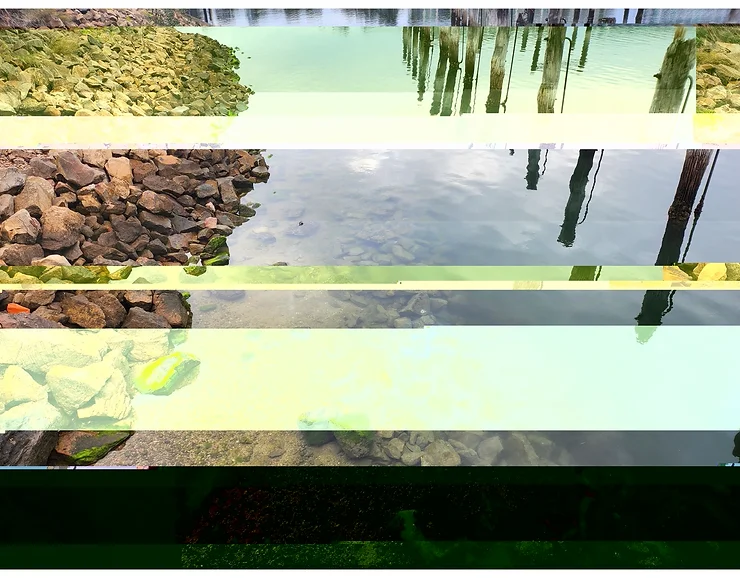With Listening to the Port, Keira Simmons has created a speculative sound walk, asking what the future holds for Port Adelaide in the year 2100.
This sound walk is one of the shortlisted pieces in the Sound Walk September Awards 2023. Here, Keira discusses her work. A slightly different version of this article first appeared on Keira’s personal website.
Listening to the Port is a Speculative Soundwalk in and about Port Adelaide, based on Kaurna Yerta (Kaurna Country) in so-called South Australia. It explores the historical impact of colonisation on the ecology of the Gulf St Vincent, and imagines future life in the region as climate change impacts continue to emerge and increase. As you move along the footpath, using a smartphone and headphones, you listen through the past, present and future, hearing soundscape compositions and narration that detail ecological, infrastructural and social changes in each time period.
Speculative Soundwalking is a mode of site-specific headphone-based interactive public art. It asks participants to move through a specific public space, listening to soundscape compositions that imagine speculative realities of the space they inhabit. As they move and listen, they are invited to embody alternative existences and perspectives, and consider their relationship to that place through the lens of the soundwalk itself. Upon returning there in the future, they will remember their experience of the soundwalk, enriching their relationship with that place going forward.
My development of Speculative Soundwalking began in 2018 with my undergraduate capstone project Listening to Abu Dhabi, which explores a speculative history and future of the region with particular emphasis on urban planning, sea level rise and temperature rise. Listeners are walked along a stretch of the downtown Corniche, hearing first-person narration and soundscape compositions imagining lifein the Emirate. Beginning in Stone Age settlements, through development in the 19th century, oil drilling in the mid-20th century, and an increasing need for climate-reactive infrastructure in the 21st century until total flooding in 2100. Listening to Abu Dhabi is hosted on soundwalking app Echoes, which allows users to trigger audio using their GPS location as they move along the designated path.
Using a similar framework, I developed Listening to the Port in 2023 as part of my further development of Speculative Soundwalking, supported by Carclew Youth Arts, Open Space Contemporary Arts, Post Office Project Gallery and Studios and Dr Jesse Budel. The cultural and ecological context of Australia is vastly different to the UAE, and this was reflected in my research. As listeners stand outside POP Gallery, the piece begins “Before”, giving a geological history of the flooding that formed the Gulf St Vincent, tens of thousands of years after First Nations Kaurna communities had already been living and caring for the land and its uniquely diverse ecology. We then continue down St Vincent Street, walking through the impact of European colonisation and industrialisation in the 19th and 20th centuries, following threads of habitat decimation, water scarcity and water quality as the Gulf is pillaged and disrespected. As we turn the corner along the water’s edge and the beginning of the 21st century, the narrator explains various water clean-up and natural resource management efforts in place that attempt to regenerate the Gulf’s ecological health.
We sit for a moment in the present day, reflecting on our current experience of extreme heat, weather and natural disasters. As we get up and move along the water towards the lighthouse, the narrator explains what the world sounds and feels like without significant long-term intervention in the mid and late 21st century. Heatwaves, water scarcity, ocean acidification, dust storms, and eventually, flooding.
By temporarily inhabiting hybrid space, Speculative Soundwalking projects create what LaBelle terms “auditory scaffolding”(LaBelle, 2010, p. 131). Pedestrians, drivers, public transport users, cyclists, and anyone else moving through public space utilise technology of many kinds (digital maps, music players, Bluetooth headphones etc.) to provide “temporal and material support” (ibid.) to structure and shape their experience of public space. By asking listeners to move through specific, familiar spaces and hear those spaces sonically altered to reflect environmental changes through time, Speculative Soundwalking projects create auditory scaffolding for listeners, providing them with a memorable sonic and narrative structure to shape their experience of the given environment. Upon returning there in the future, they will remember their experience of the soundwalk, enriching their relationship with that place going forward.
The real-world goal of these two Speculative Soundwalks is to give listeners space to receive and process complex and emotionally challenging data, which is all too tempting to ignore in our everyday lives. Speculative climate fiction works like Listening to Abu Dhabi and Listening to the Port will likely not have a direct tangible impact on the large-scale political or social change required to steer us away from the dystopian future they depict. However, their value lies in the“metaphoric and analogical powers of speculation,” opening pathways for imagining “alternative ways of living with the catastrophe in the coming era” (Raipola, 2020, p. 9) and providing listeners with the space to grapple with difficult truths.This is the foundation and purpose of Speculative Soundwalking: what will life be like in the face of this change?
I am currently developing future Speculative Soundwalking projects that explore modes of speculation outside of a chronological timeline. To hear more about these projects and the broader framework of Speculative Soundwalking as I continue to develop them in the future, please keep an eye on my website.
The winners and honourable mentions of the SWS Awards 2023 will be announced in January 2024.


